2018年全国各地高考英语试题及答案解析
2018年全国卷Ⅰ英语高考真题(含答案)

绝密★启用前2018年普通高等学校招生全国统一考试I卷英语(考试时间:120分钟试卷满分:150分)注意事项:1. 答卷前,考生务必将自己的姓名、准考证号填写在答题卡上。
2. 回答选择题时,选出每小题答案后,用铅笔把答题卡上对应题目的答案标号涂黑。
如需改动,用橡皮擦干净后,再选涂其他答案标号。
回答非选择题时,将答案写在答题卡上,写在本试卷上无效。
3. 考试结束后,将本试卷和答题卡一并交回。
第一部分听力(共两节,满分30分)做题时,先将答案标在试卷上。
录音内容结束后,你将有两分钟的时间将试卷上的答案转涂到答题卡上。
第一节(共5小题;每小题1.5分,满分7.5分)听下面5段对话。
每段对话后有一个小题,从题中所给的A、B、C三个选项中选出最佳选项。
听完每段对话后,你都有10秒钟的时间来回答有关小题和阅读下一小题。
每段对话仅读一遍。
例:How much is the shirt?A. £ 19. 15.B. £ 9. 18.C. £ 9. 15.答案是C。
1.What will James do tomorrow ?A.Watch a TV program.B.Give a talk.C.Write a report.2.What can we say about the woman?A.She's generous.B.She's curious.C.She's helpful.3.When does the train leave?A.At 6:30.B.At 8:30.C.At 10:30.4.How does the woman go to work?A.By car.B.On foot.C.By bike.5.What is the probable relationship between the speakers?A.Classmates.B.Teacher and student.C.Doctor and patient.第二节(共15小题;每小题1.5分,满分22.5分)听下面5段对话或独白。
2018年高考英语全国卷3(附含答案解析)
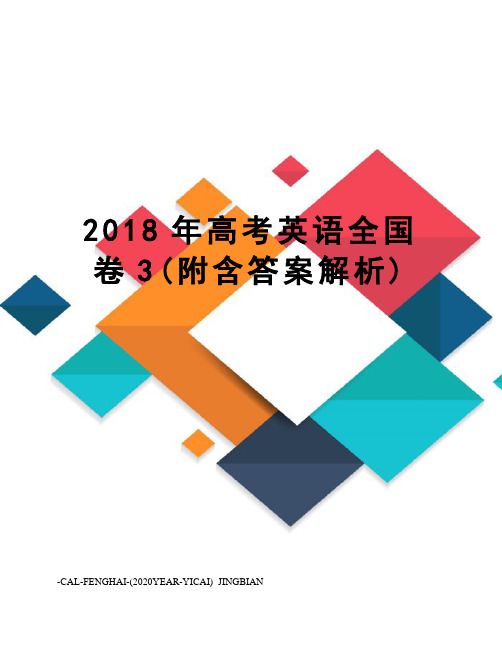
2018年高考英语全国卷3(附含答案解析) -CAL-FENGHAI-(2020YEAR-YICAI)_JINGBIAN2018年普通高等学校招生全国统一考试英语第一部分听力(共两节,满分30分)做题时,先将答案标在试卷上。
录音内容结東后,你将有两分钟的时间将试卷答案转涂到答题卡上。
第一节(共5小题;每小题15分,满分7.5分)听下面5段对话。
每段对话后有一个小题,从题中所给的A、B、C三个选项中选出最佳选项。
听完每段对话后,你都有10秒钟的时间来回答有关小题和阅读下一小题。
每段对话仅读一遍。
例: How much is the shirt?A. £19.15B. £9.18.C. £9.151. What does John find difficult in learning German?A. Pronunciation.B. Vocabulary.C. Grammar.2. What is probable relationship between the speakers?A. ColleagueB. Brother and sister.C. Teacher and student.3. Where does the conversation probably take place?A. In a bank.B. At a ticket office.C. On a train.4. What are the speakers talking about?A. A restaurant.B. A street.C. A dish.5. What does the woman think of her interview?A. It was tough.B. It was interesting.C. It was successful.第二节(共15小题;每小题1.5分,满分22.5分)听下面5段对话或独白。
英语-2018年高考真题——全国Ⅲ卷(解析版)

2018年普通高等学校招生全国统一考试(全国Ⅲ卷)英语注意事项:1. 答卷前,考生务必将自己的姓名、准考证号填写在答题卡上。
2. 作答时,务必将答案写在答题卡上,写在本试卷及草稿纸上无效。
3. 考试结束后,将本试卷和答题卡一并交回。
第一部分听力(共两节,满分30分)做题时,先将答案标在试卷上。
录音内容结束后,你将有两分钟的时间将试卷上的答案转涂到答题卡上。
第一节(共5小题;每小题1. 5分,满分7. 5分)听下面5短对话,每段对话后有一个小题,从题中给的A、B、C三个选项中选出最佳选项。
听完每段对话后,你都有10秒钟的时间来回答有关小题和阅读下一小题。
每段对话仅读一遍。
例:How much is the shirt?A. £19. 15.B. £9. 18.C. £9. 15.1. What does John find difficult in learning German?A. Pronunciation.B. V ocabulary.C. Grammar.2. What is the probable relationship between the speakers?A. Colleagues.B. Brother and sister.C. Teacher and student.3. Where does the conversation probably take place?A. In a bank.B. At a ticket office.C. On a train.4. What are the speakers talking about?A. A restaurant.B. A street.C. A dish.5. What does the woman think of her interview?A. It was tough.B. It was interesting.C. It was successful.第二节(共15小题;每小题1. 5分,满分22. 5分)听下面5段对话或独白,每段对话或独白后有几个小题,从题中所给的A、B、C三个选项中选出最佳选项。
(完整版)2018年高考全国卷1英语试题及答案
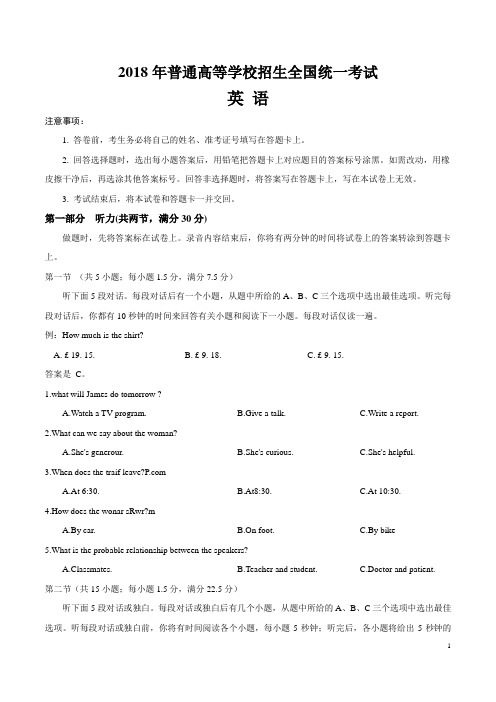
2018年普通高等学校招生全国统一考试英语注意事项:1. 答卷前,考生务必将自己的姓名、准考证号填写在答题卡上。
2. 回答选择题时,选出每小题答案后,用铅笔把答题卡上对应题目的答案标号涂黑。
如需改动,用橡皮擦干净后,再选涂其他答案标号。
回答非选择题时,将答案写在答题卡上,写在本试卷上无效。
3. 考试结束后,将本试卷和答题卡一并交回。
第一部分听力(共两节,满分30分)做题时,先将答案标在试卷上。
录音内容结束后,你将有两分钟的时间将试卷上的答案转涂到答题卡上。
第一节(共5小题;每小题1.5分,满分7.5分)听下面5段对话。
每段对话后有一个小题,从题中所给的A、B、C三个选项中选出最佳选项。
听完每段对话后,你都有10秒钟的时间来回答有关小题和阅读下一小题。
每段对话仅读一遍。
例:How much is the shirt?A. £ 19. 15.B. £ 9. 18.C. £ 9. 15.答案是C。
1.what will James do tomorrow ?A.Watch a TV program.B.Give a talk.C.Write a report.2.What can we say about the woman?A.She's generour.B.She's curious.C.She's helpful.3.When does the traif leave?A.At 6:30.B.At8:30.C.At 10:30.4.How does the wonar sRwr?mA.By car.B.On foot.C.By bike5.What is the probable relationship between the speakers?A.Classmates.B.Teacher and student.C.Doctor and patient.第二节(共15小题;每小题1.5分,满分22.5分)听下面5段对话或独白。
2018年高考英语试题一卷及答案解析
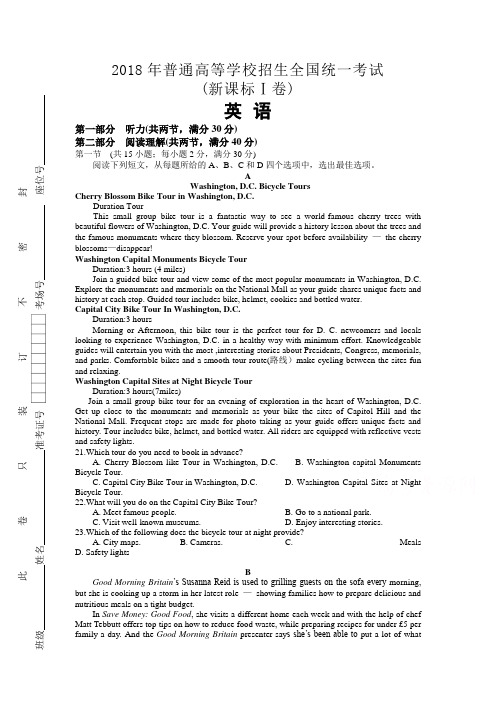
2018年普通高等学校招生全国统一考试 (新课标Ⅰ卷) 英 语 第一部分 听力(共两节,满分30分) 第二部分 阅读理解(共两节,满分40分) 第一节 (共15小题;每小题2分,满分30分) 阅读下列短文,从每题所给的A 、B 、C 和D 四个选项中,选出最佳选项。
A Washington, D.C. Bicycle Tours Cherry Blossom Bike Tour in Washington, D.C. Duration Tour This small group bike tour is a fantastic way to see a world-famous cherry trees with beautiful flowers of Washington, D.C. Your guide will provide a history lesson about the trees and the famous monuments where they blossom. Reserve your spot before availability — the cherry blossoms —disappear! Washington Capital Monuments Bicycle Tour Duration:3 hours (4 miles) Join a guided bike tour and view some of the most popular monuments in Washington, D.C. Explore the monuments and memorials on the National Mall as your guide shares unique facts and history at each stop. Guided tour includes bike, helmet, cookies and bottled water. Capital City Bike Tour In Washington, D.C. Duration:3 hours Morning or Afternoon, this bike tour is the perfect tour for D. C. newcomers and locals looking to experience Washington, D.C. in a healthy way with minimum effort. Knowledgeable guides will entertain you with the most ,interesting stories about Presidents, Congress, memorials, and parks. Comfortable bikes and a smooth tour route(路线)make cycling between the sites fun and relaxing. Washington Capital Sites at Night Bicycle Tour Duration:3 hours(7miles) Join a small group bike tour for an evening of exploration in the heart of Washington, D.C. Get up close to the monuments and memorials as your bike the sites of Capitol Hill and the National Mall. Frequent stops are made for photo taking as your guide offers unique facts and history. Tour includes bike, helmet, and bottled water. All riders are equipped with reflective vests and safety lights. 21.Which tour do you need to book in advance? A. Cherry Blossom like Tour in Washington, D.C. B. Washington capital Monuments Bicycle Tour. C. Capital City Bike Tour in Washington, D.C. D. Washington Capital Sites at Night Bicycle Tour. 22.What will you do on the Capital City Bike Tour? A. Meet famous people. B. Go to a national park. C. Visit well-known museums. D. Enjoy interesting stories. 23.Which of the following does the bicycle tour at night provide? A. City maps. B. Cameras. C. Meals D. Safety lights B Good Morning Britain ’s Susanna Reid is used to grilling guests on the sofa every morning, but she is cooking up a storm in her latest role — showing families how to prepare delicious and nutritious meals on a tight budget. In Save Money: Good Food , she visits a different home each week and with the help of chef Matt Tebbutt offers top tips on how to reduce food waste, while preparing recipes for under £5 per family a day. And the Good Morning Britain presenter say s she’s been able to put a lot of what 此卷只装订不密封班级 姓名 准考证号 考场号 座位号she’s leant into practice in her own home, preparing meals for sons, Sam,14, Finn,13, and Jack, 11."We love Mexican churros, so I buy them on my phone from my local Mexican takeaway restaurant," she explains. "I pay £5 for a portion(一份), but Matt makes them for 26p a portion, because they are flour, water, sugar and oil. Everybody can buy takeaway food, but sometimes we’re not aware how cheaply we can make this food ourselv es. "The eight-part series(系列节自), Save Money: Good Food, follows in the footsteps of ITV’s Save Money: Good Health, which gave viewers advice on how to get value from the vast range of health products on the market.With food our biggest weekly household expense, Susanna and Matt spend time with a different family each week. In tonight’s Easter special they come to the aid of a family in need of some delicious inspiration on a budget. The team transforms the family’s long weekend of celebration with less expensive but still tasty recipes.24. What do we know about Susanna Reid?A. She enjoys embarrassing her guests.B. She has started a new programme.C. She dislikes working early in the morning.D. She has had a light budget for her family.25. How does Matt Tebbutt help Susanna?A. He buys cooking materials for her.B. He prepares food for her kids.C. He assists her in cooking matters.D. He invites guest families for her.26. What does the author intend to do in paragraph 4?A. Summarize the previous paragraphs.B. Provide some advice for the readers.C. Add some background information.D. Introduce a new topic for discussion.27. What can be a suitable title for the text?A. Keeping Fit by Eating SmartB. Balancing Our Daily DietC. Making yourself a Perfect ChefD. Cooking Well for LessCLanguages have been coming and going for thousands of years, but in recent times there has been less coming and a lot more going. When the the world was still populated by hunter-gatherers,small, tightly knit (联系)groups developed their own patterns of speech independent of each other.Some language experts believe that 10,000 years ago, when the world had just five to ten million people, they spoke perhaps 12,000 languages between them.Soon afterwards, many of those people started settling down to become farmers, and their languages too became more settled and fewer in number. In recent centres, trade,industrialisation. the development of the nation-state and the spread of universal compulsory education. Especially glbalisation and better communications in the past few decades,all have caused many Languages to disappear,and dominant languages such as English.Spanish and Chinese are increasingly taking over.At present, the world has about 6 800 languages. The distribution of these languages is hugely uneven. The general rule is that mild zones have relatively few languages. Often spoken by many people while hot. wet zones have lots, often spoken by small numbers.Europe has only around 200 Languages: the Americas about 1,000. Africa 2 400; and Asia and the Pacific perhaps 3,200, of which Papua New Guinea alone accounts for well over 800. The median number (中位数)of speakers is a mere 6.000, which means that half the worlds languages are spoken by fewer people than that.Already well over 400 of the total of, 6,800 languages are close to extinction(消亡), with only a few elderly speakers left. Pick, at random, Busuu in Cameroon (eight remaining speakers),Chiapaneco in Mexico(150). Lipan Apache in the United States(two or three)or Wadjigu in Australia (one, with a question-mark): none of these seems to have much chance of survival.28. What can we infer about languages in huntergatherer times?A.They developed very fast.B. They were large in number.C. They had similar patters.D. They were closely connected29. Which of the following best explains"dominant " underlined in paragraph 2?plex.B. Advanced.C.Powerful.D.Modem.30. How many languages are spoken by less than 6, 000 people at present?A.About 6 800B.About 3 400C.About 2.400D.About 1-20031. What is the min idea of the text?A. New languages will be created.B Peoples lifestyles are reflected in languagesC. Human development results in fewer languagesD. Geography determines language evolution.DWe may think we're a culture that gets rid of our worn technology at the first sight of something shiny and new, but a new study shows that we keep using our old devices(装置) well after they go out of style. That’s bad news for the environment—and our wallets —as these outdated devices consume much more energy than the newer ones that do the same things.To figure out how much power these devices are using, Callie Babbitt and her colleagues at the Rochester Institute of Technology in New York tracked the environmental costs for each product throughout its life — from when its minerals are mined to when we stop using the device. This method provided a readout for how home energy use has evolved since the early 1990s. Devices were grouped by generation —Desktop computers, basic mobile phones, and box-set TVs defined 1992. Digital cameras arrived on the scene in 1997. And MP3 players, smart phones, and LCD TVs entered homes in 2002, before tablets and e-readers showed up in 2007.As we accumulated more devices, however, we didn't throw out our old ones. "The living-room television is replaced and gets planted in the kids' room, and suddenly one day, you have a TV in every room of the house," said one researcher. The average number of electronic devices rose from four per household in 1992 to 13 in 2007. We're not just keeping these old devices —we continue to use them. According to the analysis of Babbitt's team, old desktop monitors and box TVs with cathode ray tubes are the worst devices with their energy consumption and contribution to greenhouse gas emissions(排放)more than doubling during the 1992 to 2007 window.So what's the solution(解决方案)? The team's data only went up to 2007, but the researchers also explored what would happen if consumers replaced old products with new electronics that serve more than one function, such as a tablet for word processing and TV viewing. They found that more on-demand entertainment viewing on tablets instead of TVs and desktop computers could cut energy consumption by 44%.32. What does the author think of new devices?A. They are environment-friendly.B. They are no better than the old.C. They cost more to use at home.D. They go out of style quickly.33. Why did Babbitt's team conduct the research?A. To reduce the cost of minerals.B. To test the life cycle of a product.C. To update consumers on new technology.D. To find out electricity consumption of the devices.34. Which of the following uses the least energy?A. The box-set TV.B. The tablet.C. The LCD TV.D. The desktop computer.35. What does the text suggest people do about old electronic devices?A. Stop using them.B. Take them apart.C. Upgrade them.D. Recycle them.第二节(共5小题;每小题2分,满分10分)根据短文内容,从短文后的选项中选出能填入空白处的最佳选项。
2018年高考英语全国卷1-答案

2018普通高等学校招生全国统一考试英语答案解析第一部分听力第一节1.【答案】B【解析】原文:W: James, you’ve been watching TV for the whole evening. What’s on?M: It’s a science on the origin of the universe. I’ll give a presentation on it in my class tomorrow.2.【答案】C【解析】原文:M: Hello, do you have “The B est of Mozart”?W: Um, sorry, we’ve just sold out, but we can order on for you. If you give us your number, we’ll call you when the card arrives.3.【答案】C【解析】原文:M: We’d better be going now. Or we’ll be late for the train.W: No rush. It’s eight thirty. Now we still have two hours.4.【答案】B【解析】原文:M: I am so tired of trying all those hours to work.W: Yeath, I know what you mean. I used to drive two hours to work each way. But now I live within walking distance of my office. I don’t even need a bike.5.【答案】A【解析】原文:W: Hi, Andy, I didn’t see you in Professor Smiths’ class yesterday. What happened?M: Well, I had a headache, so I called him and asked for sick leave.第二节6.【答案】B7.【答案】A【解析】原文:W: The biggest mistake I made, uh, was leaving college in my last year and not competing myeducation. So, I’m thinking of going back to school.M: School? To study what?W: Ecology, I’m interested in the relation ship between humans and nature.M: Cool? Is it what you studied years ago?W: No, I majored in chemistry then.8.【答案】B9.【答案】C【解析】原文:M: Good morning, Madam. I am your guide for this trip.W: How lovely! Could you tell me about the hotel I’m going to stay at.M: Yes, of course! The Grand Hotel opened in nineteen ninety, and it sits on the seaside along the south coast highway.It is the most beautiful hotel here.W: That sounds great!M: And there are some restaurants outside. So at dinner time, you’d have a lot of choices.W: That’s really nice. I like to have some local food while traveling. What about the scenery around it?M: The hotel has the best views of the Pacific Ocean. Oh, I think I will love this hotel.10.【答案】C11.【答案】A12.【答案】B【解析】原文:W: Hi, Mike.M: Hi, Alice. Nice to see you. You don’t often come here.W: I usually have fast food delivered to my office. I just came here for a change today. The environment here is good, clean and relatively quiet.M: And I heard the food is tasty. By the way, are you going to the concert tomorrow evening?W: Yes, are you?M: Yeah! Catherine was supposed to go with me, but she may have to work extra hours tomorrow. Do you know anyone who might like to go?W: No, but if you like, I can ask around or Joan mi ght want to go. Oh, yes, she is a great fan of classical music. I’ll give her a ring after lunch.13.【答案】A14.【答案】A15.【答案】C16.【答案】B【解析】原文:W: Hi, I’ve only just arrived.M: Oh, good. Now, here are the keys. Let’s go in. There are two apartments. The one for rent is on the right. Do come in.W: Thank you. I like the carpet. The color is nice, isn’t it?M: Yes, and this apartment is in good condition. Here is your lounge(起居室,休息室).W: Where would we eat?M: There is this corner here, or you can use your kitchen, come and see!W: The kitchen is quite small.M: Yes, but it has everything , cooker, French window(落地窗) and dishwasher. And there are lots of cupboards. Let me show you the bedrooms. This is the smaller one. It’s a good size, though. Now come into the other bedroom.You can see the bathroom too.W: Yes, it is very nice. But I will have to ask my friend first and we will come together. I understand it is eight hundred dollars a month.M: Yes, but a few blocks down town would be much more expensive.W: Well, thank you. I will be in touch.17.【答案】C18.【答案】B19.【答案】C20.【答案】A【解析】原文:Thank you very much. Thank you, Doctor Johnson. Well, it is really great to be back at university again. The thing that I wanted to tell you today is this education is important. When I came to the US, I was only thinking about being a carpenter, but I could not read the newspaper. And I could not understand the news on the television or movies or anything like this. So I enter the city college to take English classes for foreign students. I was very proud that I was going to a college because no one in my family ever went to any college or to any university. You know, when you’re fifteen years old in my country, you finish school and then you learn a trade. And that’s exactly what I did when I was fifteen years old. I learned how to be a carpenter. A year later, I came to America. Luckily I met a very good teacher who encouraged me to take some math classes. And I became a full time college student. And today when I look back, I’m so happy because you never know where life will take you. All of a sudden, I started making money because I was really good at math. You know how to work out everything with math is so important. This is something that I learned when I started my own business, which is doing really well.第二部分阅读理解第一节21.【答案】A【解析】细节理解题。
2018年英语高考试题和答案.doc
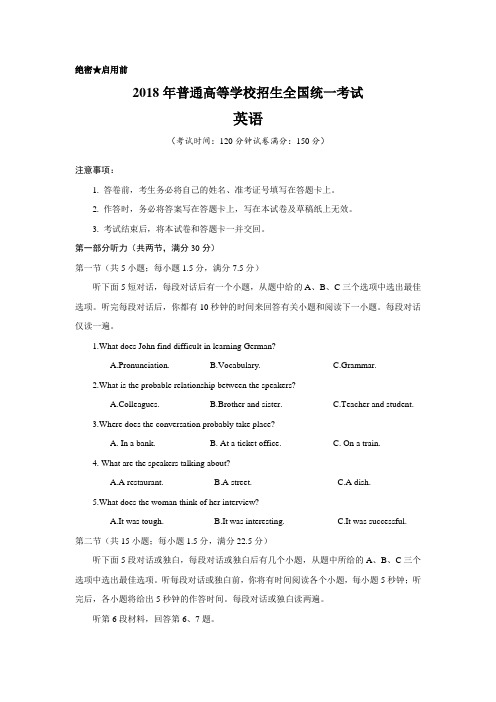
绝密★启用前2018年普通高等学校招生全国统一考试英语(考试时间:120分钟试卷满分:150分)注意事项:1. 答卷前,考生务必将自己的姓名、准考证号填写在答题卡上。
2. 作答时,务必将答案写在答题卡上,写在本试卷及草稿纸上无效。
3. 考试结束后,将本试卷和答题卡一并交回。
第一部分听力(共两节,满分30分)第一节(共5小题;每小题1.5分,满分7.5分)听下面5短对话,每段对话后有一个小题,从题中给的A、B、C三个选项中选出最佳选项。
听完每段对话后,你都有10秒钟的时间来回答有关小题和阅读下一小题。
每段对话仅读一遍。
1.What does John find difficult in learning German?A.Pronunciation.B.Vocabulary.C.Grammar.2.What is the probable relationship between the speakers?A.Colleagues.B.Brother and sister.C.Teacher and student.3.Where does the conversation probably take place?A. In a bank.B. At a ticket office.C. On a train.4. What are the speakers talking about?A.A restaurant.B.A street.C.A dish.5.What does the woman think of her interview?A.It was tough.B.It was interesting.C.It was successful.第二节(共15小题;每小题1.5分,满分22.5分)听下面5段对话或独白,每段对话或独白后有几个小题,从题中所给的A、B、C三个选项中选出最佳选项。
2018高考英语试题全国卷及答案
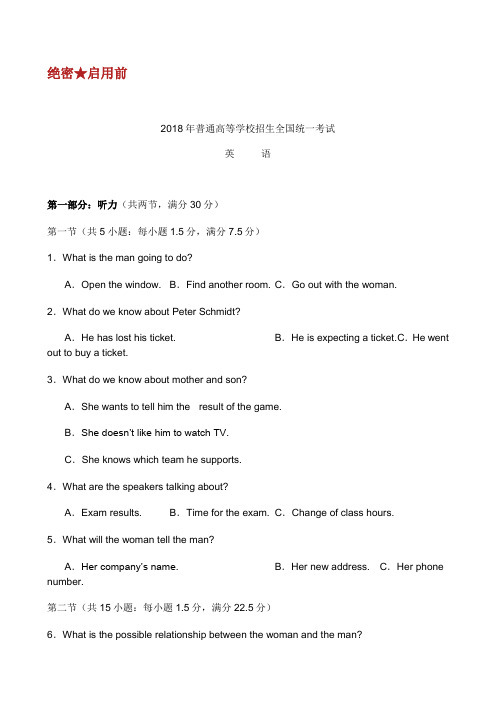
绝密★启用前2018年普通高等学校招生全国统一考试英语第一部分:听力(共两节,满分30分)第一节(共5小题:每小题1.5分,满分7.5分)1.What is the man going to do?A.Open the window. B.Find another room. C.Go out with the woman.2.What do we know about Peter Schmidt?A.He has lost his ticket. B.He is expecting a ticket. C.He went out to buy a ticket.3.What do we know about mother and son?A.She wants to tell him the result of the game.B.She doesn’t like him to watch TV.C.She knows which team he supports.4.What are the speakers talking about?A.Exam results. B.Time for the exam. C.Change of class hours.5.What will the woman tell the man?A.Her company’s name.B.Her new address. C.Her phone number.第二节(共15小题:每小题1.5分,满分22.5分)6.What is the possible relationship between the woman and the man?A.Wife and husband. B.Doctor and patient. C.Boss and secretary 7.What does the woman think about the man?A.He is not good to the children.B.He is not telling the truth.C.He sleeps too much.8.Where does the woman want to go?A.An office. B.A fruit shop. C.A police station. 9.What does the woman have to do now?A.Wait for Mark at the crossroads.B.Walk ahead and turn right.C.Walk a little way back.10.What exactly does the man want to find out?A.What people think of the bus service.B.How many people are using the bus service.C.Which group of people use the bus service most often.11.What does the woman say about the bus service?A.The distance between bus stops is too long.B.The bus timetables are full of mistakes.C.Buses are often not on time.12.Why does the woman say her husband is fortunate?A.He often goes to work in a friend’s car.B.He doesn’t need to go shopping by bus.C.He lives close to the bus station.13.What is the probable relationship between the two speakers?A.Salesperson and customerB.Old school friendsC.Fellow workers14.What do we know about the woman?A.She is fond of her work. B.She is tired of traveling. C.She is interested in law.15.What is the man?A.A company manager. B.A salesperson. C.A lawyer.16.Why does the woman ask for the man’s address?A.To send him a book.B.To get together with him.C.To repair something at his home.17.What is the aim of the program?A.To keep trainees in shape.B.To improve public relations.C.To develop leadership skills.18.Which of the following will the trainess be doing during the program?A.Attenling lectures on managementB.Preparing reports for the company.C.Making plans for a journey.19.How long will the program last?A.8 days B.12 days C.20 days.20.If people want to join the program, what should they do after the meeting?A.Take a pre-test B.Pay for the program. C.Sign on a piece of paper.第二部分:英语知识运用(共两节,满分45分)第一节:单项填空(共15小题:每小题1分,满分15分)21.Don’t be afraid of asking for help it is needed.A.unless B.since C.although D.when22.A cook will be immediately fired if he is found in the kitchen.A.smoke B.smoking C.to smoke D.smoked23.Allen had to call a taxi because the box was to carry all the way home.A.much too heavy B.too much heavy C.heavy too much D.too heavy much24.—Sorry, Joe, I didn’t mean to…—Don’t call me “Joe”. I’m Mr Parker to you, and you forget it!A.do B.didn’t C.did D.don’t25.If anybody calls, tell them I’m out, and ask them to their name and address.A.pass B.write C.take D.leave26.The sign reads “In case of fire, break the glass and push red button.”A.不填;a B.不填;the C.the; the D.a;a27.All morning as she waited for the medical report from the doctor, hernervouseness .A.has grown B.is growing C.grew D.had grown28.A left luggage office is a place where bags be left for a short time, especially at a railway station.A.should B.can C.must D.will29.We’re going to the bookstore in John’s car. You can come with us you can meet us there later.A.but B.and C.or D.then30.Why don’t you put the meat in the fridge? It will fresh for several days.A.be stayed B.stay C.be staying D.have stayed31.News reports say peace talks between the two countries with no agreement reached.A.have broken down B.have broken out C.have broken in D.have broken up32.—There’s coffee and tea: you can have .—Thanks.A.either B.each C.one D.it33.—Susan, go and join your sister cleaning the yard.—Why ? John is sitting there doing nothing.A.him B.he C.I D.me34.The old couple have been married for 40 years and never once with each other.A.they had quarreled B.they have quarreledC.have they quarreled D.had they quarreled35.—I think you should phone Jenny and say sorry to her.— .It was her fault.A.No way B.Not possible C.No chance D.Not at all第二节:完形填空(共20小题:每小题1.5分,满分30分)阅读下面短文,掌握其大意,然后从36—55各题所给的四个选项(A、B、C和D)中,选出最佳选项。
- 1、下载文档前请自行甄别文档内容的完整性,平台不提供额外的编辑、内容补充、找答案等附加服务。
- 2、"仅部分预览"的文档,不可在线预览部分如存在完整性等问题,可反馈申请退款(可完整预览的文档不适用该条件!)。
- 3、如文档侵犯您的权益,请联系客服反馈,我们会尽快为您处理(人工客服工作时间:9:00-18:30)。
2018年全国各地高考英语试题及答案解析全国Ⅰ卷第一部分听力(共两节,满分30分)第一节(共5小题;每小题1.5分,满分7.5分)听下面5段对话。
每段对话后有一个小题,从题中所给的A、B、C三个选项中选出最佳选项。
听完每段对话后,你都有10秒钟的时间来回答有关小题和阅读下一小题。
每段对话仅读一遍。
1.What will James do tomorrow?A.Watch a TV program.B.Give a talk.C.Write a report.答案:B2.What can we say about the woman?A.She's generous.B.She's curious.C.She's helpful.答案:C3.When does the train leave?A.At 6:30.B.At 8:30.C.At 10:30.答案:C4.How does the woman go to work?A.By car. B.On foot. C.By bike.答案:B5.What is the probable relationship between the speakers?A.Classmates.B.Teacher and student.C.Doctor and patient.答案:A第二节(共15小题;每小题1.5分,满分22.5分)听下面5段对话或独白。
每段对话或独白后有几个小题,从题中所给的A、B、C三个选项中选出最佳选项。
听每段对话或独白前,你将有时间阅读各个小题,每小题5秒钟;听完后,各小题将给出5秒钟的作答时间。
每段对话或独白读两遍。
听第6段材料,回答第6、7题。
6.What does the woman regret?A.Giving up her research.B.Dropping out of college.C.Changing her major.答案:B7.What is the woman interested in studying now?A.Ecology. B.Education. C.Chemistry.答案:A听第7段材料,回答第8、9题。
8.What is the man?A.A hotel manager.B.A tour guide.C.A taxi driver.答案:B9.What is the man doing for the woman?A.Looking for some local foods.B.Showing her around the seaside.C.Offering information about a hotel.答案:C听第8段材料,回答第10至12题。
10.Where does the conversation probably take place?A.In an office.B.At home.C.At a restaurant.答案:C11.What will the speakers do tomorrow evening?A.Go to a concert.B.Visit a friend.C.Work extra hours.答案:A12.Who is Alice going to call?A.Mike. B.Joan. C.Catherine. 答案:B听第9段材料,回答第13至16题。
13.Why does the woman meet the man?A.To look at an apartment.B.To deliver some furniture.C.To have a meal together.答案:A14.What does the woman like about the carpet?A.Its color. B.Its design. C.Its quality. 答案:A15.What does the man say about the kitchen?A.It's a good size.B.It's newly painted.C.It's adequately equipped.答案:C16.What will the woman probably do next?A.Go downtown.B.Talk with her friend.C.Make payment.答案:B听第10段材料,回答第17至20题。
17.Who is the speaker probably talking to?A.Movie fans.B.News reporters.C.College students.答案:C18.When did the speaker take English classes?A.Before he left his hometown.B.After he came to America.C.When he was 15 years old.答案:B19.How does the speaker feel about his teacher?A.He's proud.B.He's sympathetic.C.He's grateful.答案:C20.What does the speaker mainly talk about?A.How education shaped his life.B.How his language skills improved.C.How he managed his business well.答案:AText 1W:James, you've been watching TV for the whole evening. What's on?M:It's a science program on the origin of the universe. I'll give a presentation on it in my class tomorrow.Text 2M:Hello, do you have “The Best of Mozart”?W:Um, sorry, we've just sold out. But we can order one for you. If you give us your number, we'll call you when the CD arrives.Text 3W:W'd better be going now, or we'll be late for the train.M:No rush. It's 8:30 now. We still have two hours.Text 4M:I am so tired of driving all those hours to work.W:Yeah. I know what you mean. I used to drive two hours to work each way. But now, I live within walking distance of my office. I don't even need a bike.Text 5W:Hi, Andy. I didn't see you in Professor Smith's class yesterday. What happened?M:Well, I had a headache. So, I called him and asked for sick leave.听第6段材料,回答第6、7题。
Text 6W:The biggest mistake I made,uh ...was leaving college in my last year and not completing my education. So, I'm thinking of going back to school.M:School? To study what?W:Ecology. I'm interested in the relationship between humans and nature.M:Cool. Is it what you studied years ago?M:No, I majored in chemistry then.听第7段材料,回答第8、9题。
Text 7M:Good morning, madam. I am your guide for this trip.W:How lovely! Could you tell me about the hotel I'm going to stay at?M:Yes, of course. The Grand Hotel opened in 1990. And it sits on the seaside along the South Coast Highway. It is the most beautiful hotel here.W:That sounds great.M:And there are some restaurants outside. So, at dinnertime, you'd have a lot of choices.W:That's really nice. I like to have some local foods while traveling.What about the scenery around it?M:The hotel has the best views of the Pacific Ocean.W:Oh, I think I will love this hotel.听第8段材料,回答第10至12题。
Text 8W:Hi, Mike.M:Hi, Alice. Nice to see you. You don't often come here.W:I usually have fast food delivered to my office. Just came here for a change today.M:The environment here is good-clean and relatively quiet.W:Yeah, and I heard the food is tasty. By the way, are you going to the concert tomorrow evening?M:Yes, are you?W:Yeah. Catherine was supposed to go with me. But she may have to work extra hours tomorrow. Do you know anyone who might like to go?M:No. But if you like, I can ask arounD.Uh, Joan might want to go.W:Oh, yes.She's a great fan of classical musiC.I'll give her a ring after lunch.听第9段材料,回答第13至16题。
